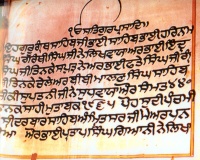Template:AOW83
Structure of Guru Granth Sahib
The Guru Granth Sahib begins with the word "Ek Onkar" – The All Pervading Being. From this Word to the tenth Word “Gur-parshad” is called the Mool Mantra. After this is the rest of the composition called the Japji composed by Guru Nanak Dev. This comprises 38 Pauris or stanzas, a Prologue and an Epilogue. This is one of the morning prayer of the Sikhs.
The next composition has two parts - (1) "So Dar" and (2) "So Purkh". The Bani, "So Dar" contains 5 Shabads and "So Purkh" contains 4 Shabads. This form most of the evening prayer of the Sikhs and is called the Rehras. After this is the Bani called Sohila (full name, Kirtan Sohila), which contains 5 Shabads and is the bed-time prayer.
Within it's 1430 pages, most of the Shabads (hymns) of the Sri Guru Granth Sahib are arranged in thirty-one Ragas, the traditional Indian musical measures and scales. Within the Ragas, they are arranged by order of the Sikh Gurus, with the shabads of the Hindu and Muslim saints. The shabads are written in various meters and rhythms, and are organized accordingly. For instance, Ashtapadi - eight steps, or Panch-padi - five steps. The Sri Guru Granth Sahib is written in Gurmukhi script, but the shabads were written in many different languages including Punjabi, Sanskrit and Persian. ....Continued.

